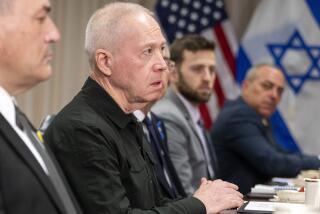Won’t Be Ready to Attack Jan. 15, Military Tells Bush
- Share via
WASHINGTON — Senior defense officials have advised the White House that the military will not be ready to attack Iraq until several weeks after Jan. 15, the deadline the United Nations has set for complete Iraqi withdrawal from Kuwait, Administration officials said Tuesday.
Defense Secretary Dick Cheney and Gen. Colin L. Powell, chairman of the Joint Chiefs of Staff, presented the consensus military view at a meeting with President Bush at Camp David on Monday, sources said.
The two officers urged that any military strike be delayed until the full 430,000-troop American force is in place, which is not expected until sometime after Feb. 1.
If Bush accepts the military recommendation, it will give Iraqi President Saddam Hussein some breathing room, as well as providing diplomats additional time to seek an acceptable formula for ending the crisis.
At the same time, the delay seriously undercuts efforts by Secretary of State James A. Baker III to secure an early meeting with Hussein and the complete Iraqi withdrawal from Kuwait by Jan. 15.
Senior Administration officials have said for the last several days that a Jan. 15 or Jan. 16 attack was unlikely in any event, largely because it has been clear for some time that U.S. troops will not all be in place, acclimated and trained for battle until some weeks later.
Cheney and Powell returned Sunday night from five days in Saudi Arabia, where they met with commanders and troops in an effort to assess the readiness of the U.S. expeditionary force, which currently numbers about 300,000 men and women.
They received extensive briefings from Gen. H. Norman Schwarzkopf, the commander in chief of U.S. forces in the Persian Gulf, and his senior aides.
Schwarzkopf reportedly informed his superiors that the military will not be in a favorable position to launch an attack until after the arrival of 130,000 additional troops, many of them en route from Europe. The transport of the troops and their equipment has been delayed by bad weather in Europe and difficulties in finding enough shipping to move the massive force.
Schwarzkopf’s private assessment to Cheney and Powell echoed public statements by his deputy, Lt. Gen. Calvin A. H. Waller, who told reporters last week that he had advised President Bush to delay any offensive operation until after the bulk of the reinforcements arrived and were trained. He said it would take at least until Feb. 1, and more likely until the middle of the month, before those conditions were met.
Although neither Cheney nor Powell has spoken publicly about his advice to the President, both have consistently noted in public that different parts of the U.S. force would be ready at different times. Officials have said that U.S. air forces and a number of tank and infantry divisions are ready now to participate in military operations.
While Cheney said last week that the entire force would not be ready to fight on Jan. 15, he said several times that the United States would be in a position to launch a war soon after the deadline expires. He would not be more specific, although he strove diligently to keep the threat of early military action alive in spite of Gen. Waller’s comments.
An Administration official on Tuesday confirmed that Cheney had advised Bush to hold off on offensive action until the full force is in place. But he also raised the possibility that officials might be conducting a campaign of deception to preserve surprise should Bush want to attack on or shortly after Jan. 15.
“I don’t know if they’re doing psychological warfare in the newspapers or if it’s real,” the official said. “They could be just blowing smoke to confuse everybody.”
Cheney said during his visit to Saudi Arabia that war looked “increasingly likely” because diplomatic efforts to secure the retreat of Iraqi forces from Kuwait appeared to have reached a dead end.
Professional military officers are inherently conservative, wanting as much manpower and firepower as they can possibly muster before initiating battle.
Waller, comparing himself to a football coach, said last week, “I want everything I can possibly get and have it on my side of the field when I get ready to go into the Super Bowl.”
When asked what he would say if the owner, meaning President Bush, asked him to play on Jan. 15, Waller said, “I’d tell him, ‘No, I’m not ready to do the job.’ ”
One military officer traveling with Cheney and Powell said that the military, still suffering from the trauma of Vietnam, does not want to be blamed for defeat or high casualties if President Bush orders them into battle before they are ready.
A second level of considerations may be in play as well. At stop after stop on their tour of U.S. military bases in Saudi Arabia, Cheney and Powell were asked whether Operation Desert Shield had the support of “the people back home.”
While the senior officials assured the troops that the public was behind them, there is a strong undercurrent of concern that Americans will support a short war that ends in decisive victory--and nothing else. Thus, Cheney, Powell and all their subordinates want to be sure they are fully ready if the order comes from the White House to, as troops in the Saudi desert say, “go north.”
More to Read
Get the L.A. Times Politics newsletter
Deeply reported insights into legislation, politics and policy from Sacramento, Washington and beyond. In your inbox twice per week.
You may occasionally receive promotional content from the Los Angeles Times.









